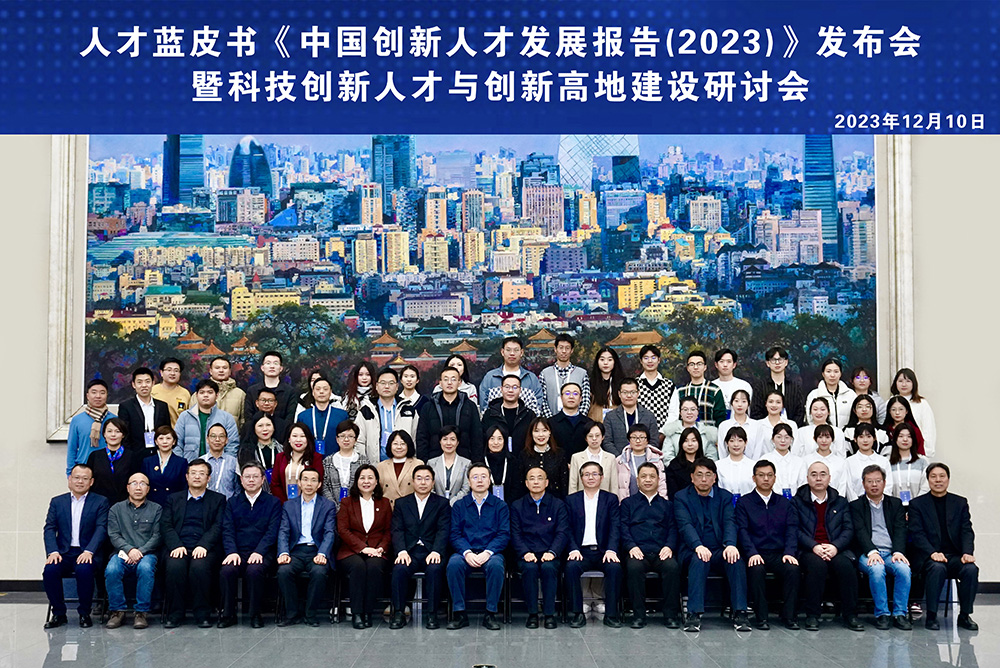China's First Blue Book of Talent: Annual Report on China's Innovative Talent Development(2023) Released in CUEB
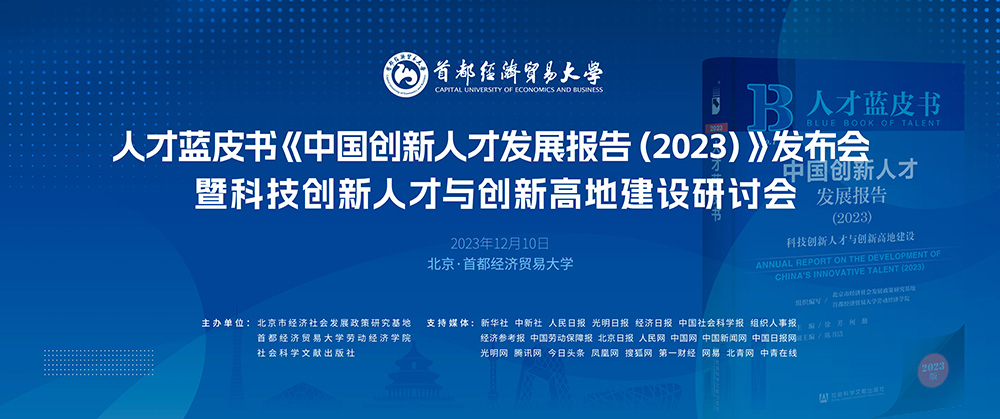
On December 10, CUEB successfully held the conference on sci-tech innovative talents and innovation hub construction. At the conference, China’s first Blue Book of Talent: the Annual Report on China’s Innovative Talent Development (2023) (henceforth the Report (2023)), was released. The book focuses on the pattern and path of sci-tech innovative talents and innovation hub construction, serving as significant references for the construction of a world center for talents and innovation. The conference was jointly organized by Beijing Economic and Social Development Policy Research Base (hereafter the Research Base), School of Labor Economics and Social Sciences Academic Press (SSAP).
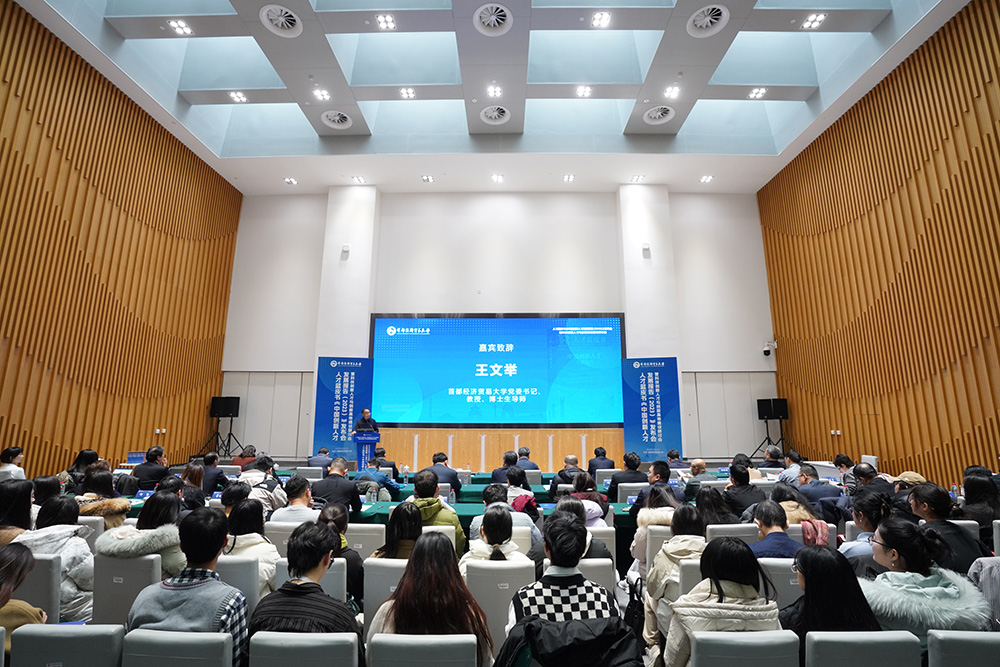
Present at the conference were Han Geng, Deputy Secretary-General of People’s Government of Beijing Municipality, Wang Wenju, Party Secretary of CUEB, Yu Haijiao, Deputy Director-General of Beijing Municipal Bureau of Talent Work, Cui Zhanhui, Member and Deputy Chairperson of the Party Leadership Group of Beijing Federation of Social Science Circles and Deputy Director Social Science Planning Office, Xu Fang, Deputy Secretary of CUEB Party Committee, Chen Yanbin, Member of Party Standing Committee and Vice President, Cai Jihui, Deputy Chief Editor of SSAP and Executive Dean of Pishu Institute, Lai Desheng, Professor, Doctoral Supervisor and Deputy Director of Department of Social and Ecological Civilization at Party School of the Central Committee of CPC (National Academy of Governance), Chen Jin, Professor and Doctoral Supervisor at School of Economics and Management of Tsinghua University, Yaokai, Professor and Doctoral Supervisor at School of Management of Fudan University, Yun Wei, Proprietor of Branch House on Economics and Management of SSAP, He Qin, Chief Editor of this Blue Book, Professor of School of Labor Economics and Director of the Research Base, and Chen Shujie, Associate Professor of School of Labor Economics and Deputy Director of the Research Base.
Leaders from the Bureau of Talent Work and the Report (2023) editorial team delivered speeches during the conference. This part was presided over by Xu Fang, CUEB Deputy Party Secretary and Executive Editor of this blue book.
Wang Wenju expressed congratulations to the conference and gratitude to the peer institutions as well as leaders and experts attending this conference. He noted that, in the 20th National Congress of CPC, China first put forward coordinated plans on education, science and technology, and personnel, emphasizing the significant role of personnel in fully building a modern socialist country. Therefore, work for personnel development should be placed at the strategic level to offer chances and guidance for research and development of Talent Science in the new era. CUEB has always insisted on serving the national major strategies and capital economic and social development. In 2023, we have achieved rapid growth in high-quality research and actively put outcomes of the think tank into practice and the discipline of Talent Science met the needs of capital high-quality development in the new era. All of these efforts advance the strategy of developing a quality workforce in the new era. Wang also stated that the Report (2023) has gathered experts around the country, and CUEB would keep building a high-level platform for theory and practice exchange and promote cooperation on the Talent Science among government, industry, university, and research, making contributions to the establishment of a world center for talent and innovation.
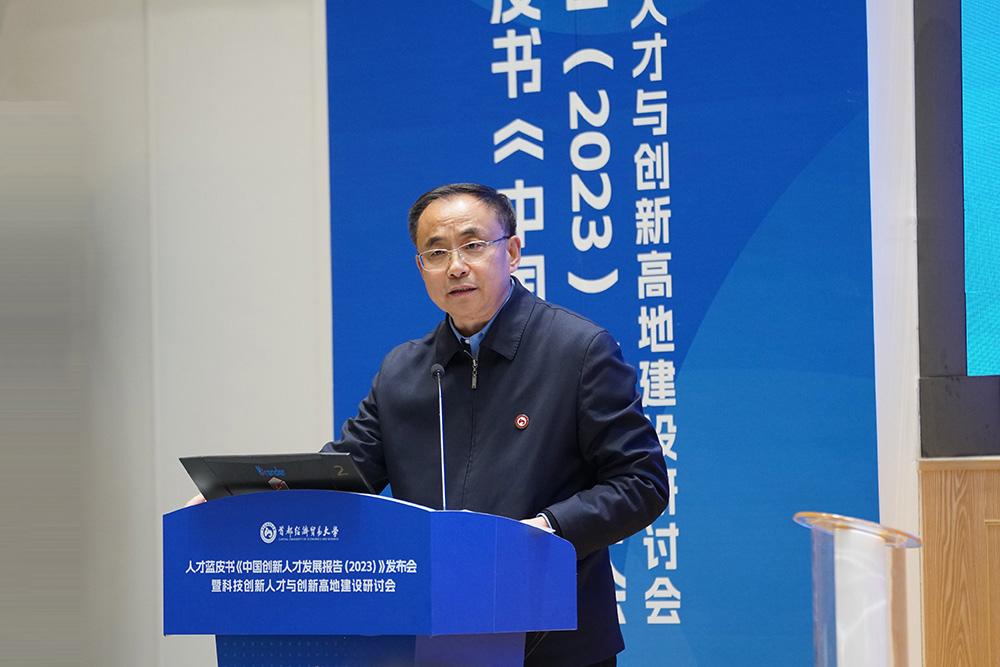
Han Geng stated that education, science & technology, and personnel are three essential and strategic factors in fully building a modern socialist country, and the Party. Our country always attaches great importance to the construction of Beijing International Technological Innovation Center (the Center), especially the high-caliber talent hub. This Blue Book was published at the right time, and its research data and policy proposals can offer scientific reference and intellectual support for building the Center with a strong competitive edge. Han also hoped that experts and scholars could put forward more targeted suggestions and measures on the training of innovative personnel and the construction of an innovation hub, advancing Beijing to take the lead in building the Center.
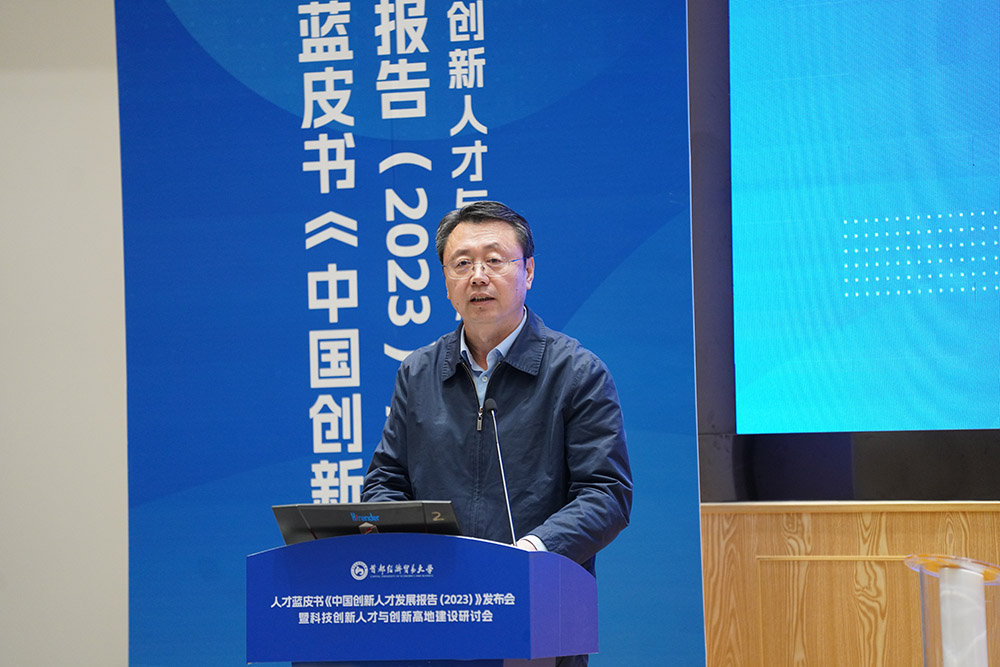
Yu Haijiao said that building a high-level talent hub is a glorious mission and major responsibility entrusted to Beijing by the Party Central Committee and a significant step to achieve sci-tech self-reliance and self-strengthening for advanced breakthroughs in core technologies. Beijing boasts unique advantages in building a high-level talent hub. This Blue Book, with focuses on “sci-tech innovative talents and innovation hub construction”, systematically summarizes the top-level design, distribution pattern, evaluation system, and regional exploration of innovative personnel training since the implementation of the strategy on developing a quality workforce in the new era, and then puts forward relevant policy proposals. All of these have offered intellectual support for capital high-quality development. He hoped that this conference could contribute to the cultivation of sci-tech personnel and the construction of a high-caliber talent hub in Beijing.
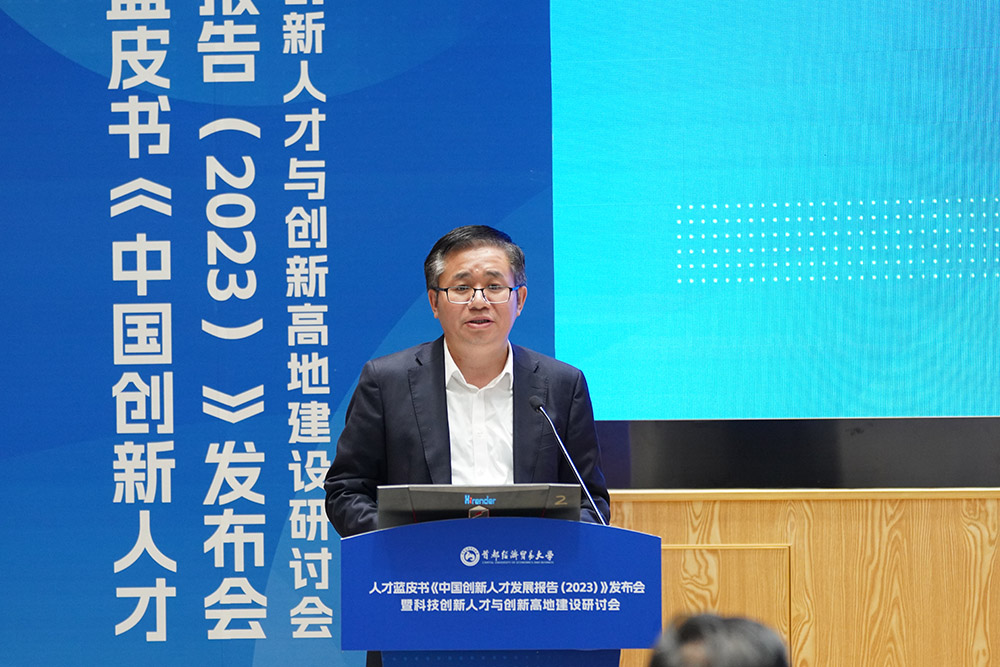
Cui Zhanhui said that the Research Base serves as a platform to gather experts around the country, prioritizes both policy and academic research, and shares theoretical and practical experience of innovative human resources with Chinese characteristics through the integration of interdisciplinary research, better serving the innovative personnel with the strength of think tanks. The Report (2023) offers a significant reference to accelerate building Beijing into a center for technological innovation Beijing Federation of Social Science Circles and the Social Science Planning Office will continue to support the development of the Research Base and the construction of a world base for personnel and innovation.
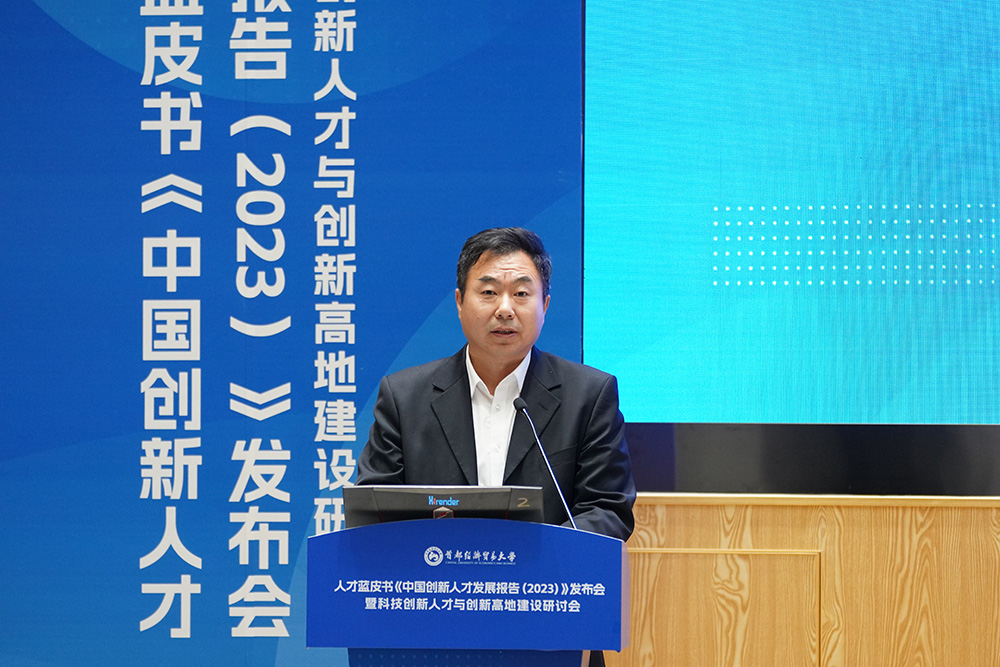
Cai Jihui stated that the Blue Book, co-developed by the Research Base and School of Labor Economics was a landmark in think tanks among Pishu publications. The Report (2023) reveals the nature of sci-tech self-reliance and self-strengthening at higher levels underpinned by innovative personnel, which plays an important role in promoting the strategy of developing a quality workforce and developing the new pattern of talent-driven development and innovation. Cai looked forward to joining hands with the Research Base and CUEB in the future, writing a new chapter for the development of both Pishu and modern innovative personnel.
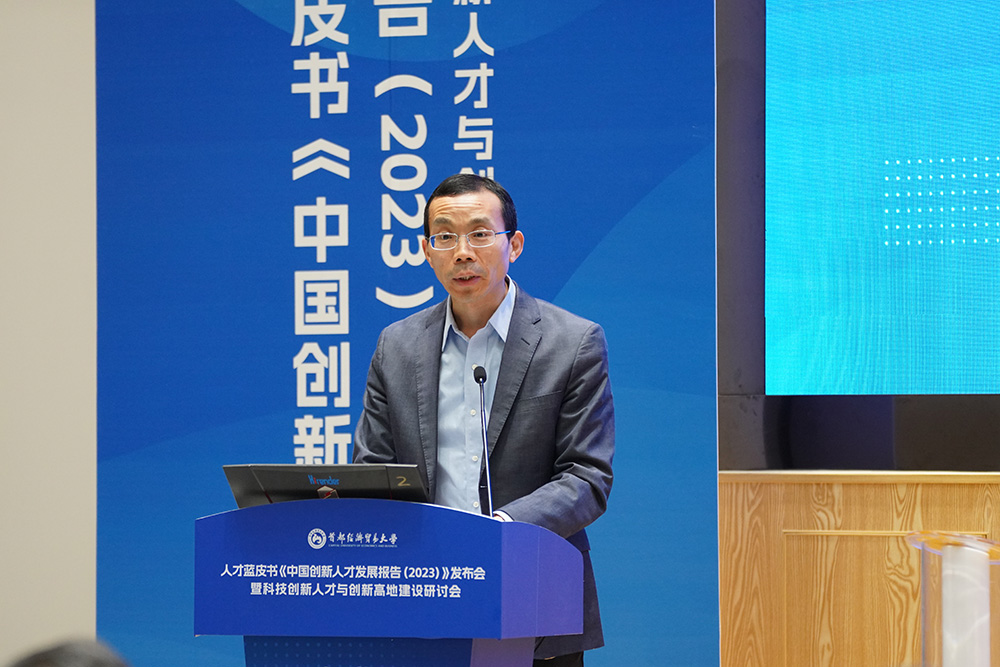
At the conference, Xu Fang, Chen Yanbin, Chen Jin, Yao Kai, He Qin and Chen Shujie jointly released the Blue Book.
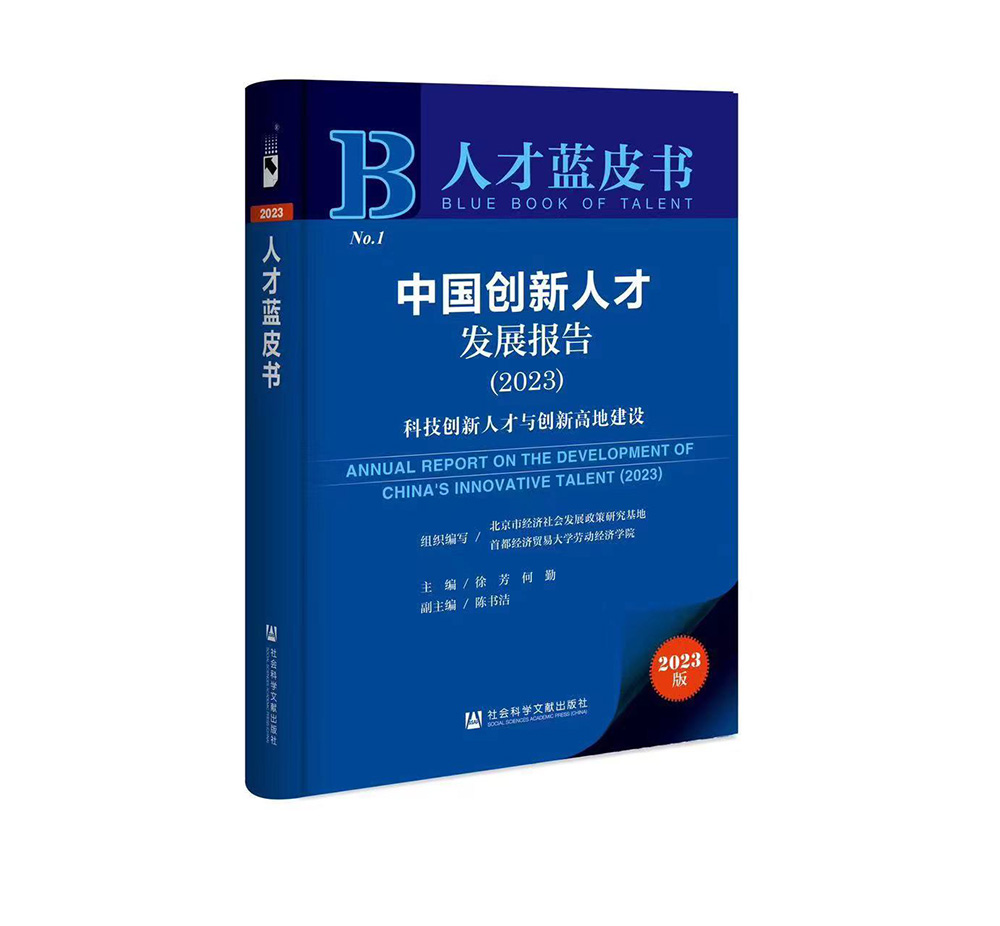
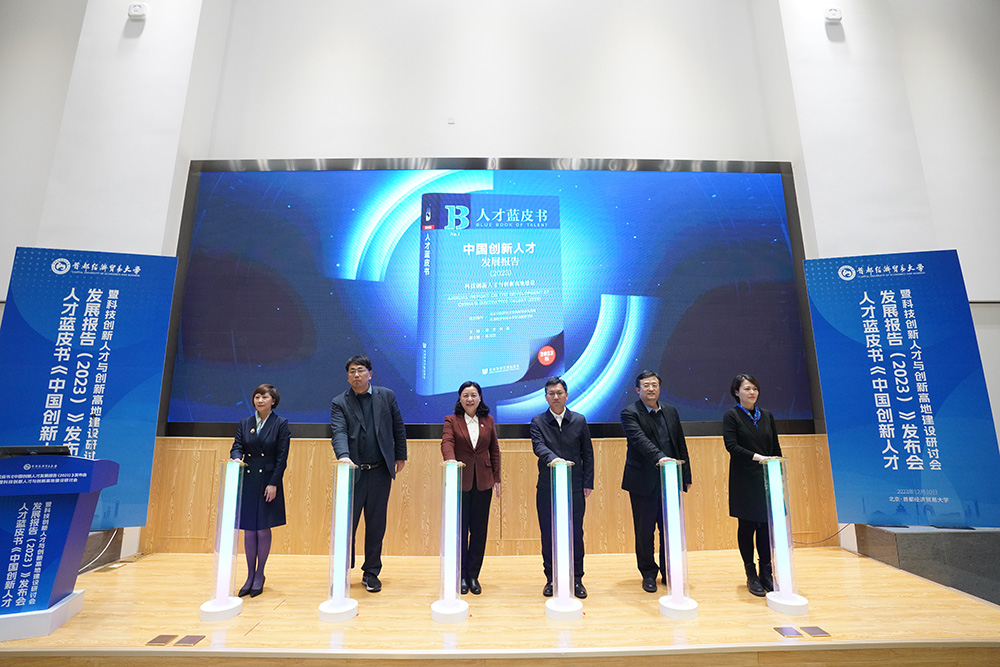
He Qin introduced the research framework of the Blue Book. She gave a detailed description of the basic information, structure, characteristics, and the team, with a focus on strategic leadership, evaluation and analysis, and regional exploration. She mentioned that the Blue Book would carry out continuous research in core technologies in key fields and top sci-tech leaders, innovation-driven development, and cultivation of young sci-tech personnel and other fields.
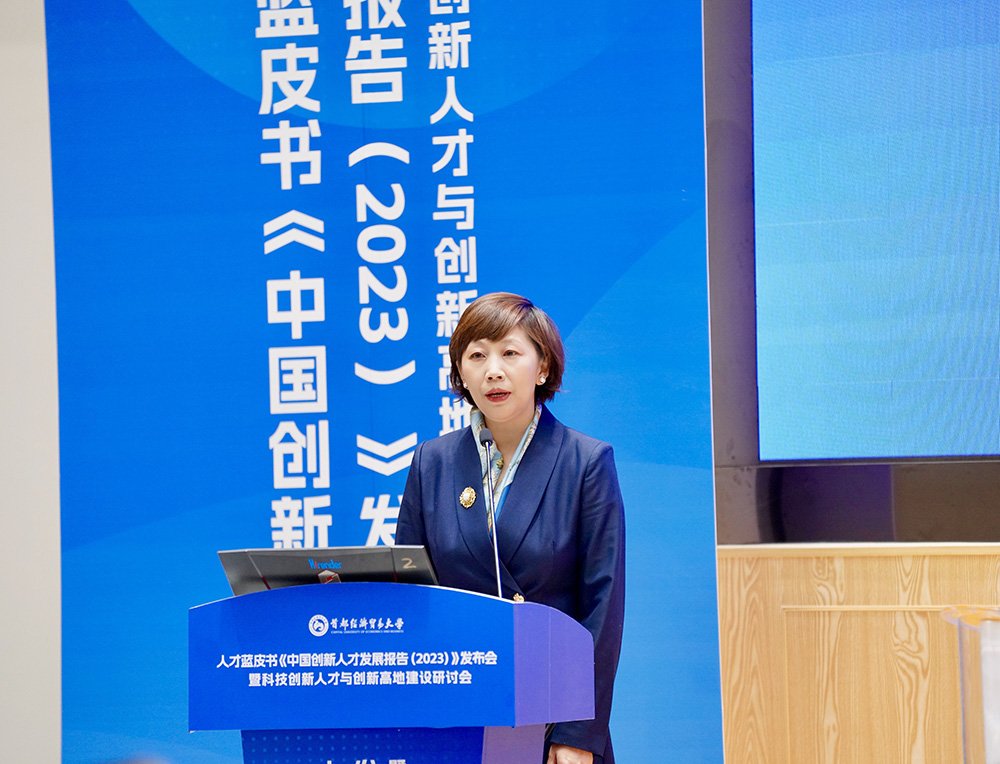
Chen Shujie released the general report of this bluebook: Review and Outlook of China Innovative Talents Development (2023). She analyzed the environment and policy for the development of innovative personnel in China, conducted an in-depth study on the scale, structure, and development trend of the innovative personnel represented by academicians of the Chinese Academy of Sciences and Chinese Academy of Engineering, Creative Research Groups, winners of the National Science Fund for Distinguished Young Scholars and the National Science Fund for Excellent Young Scholars, and highly skilled talent, and also gave a forecast of China Innovative Talents Index.
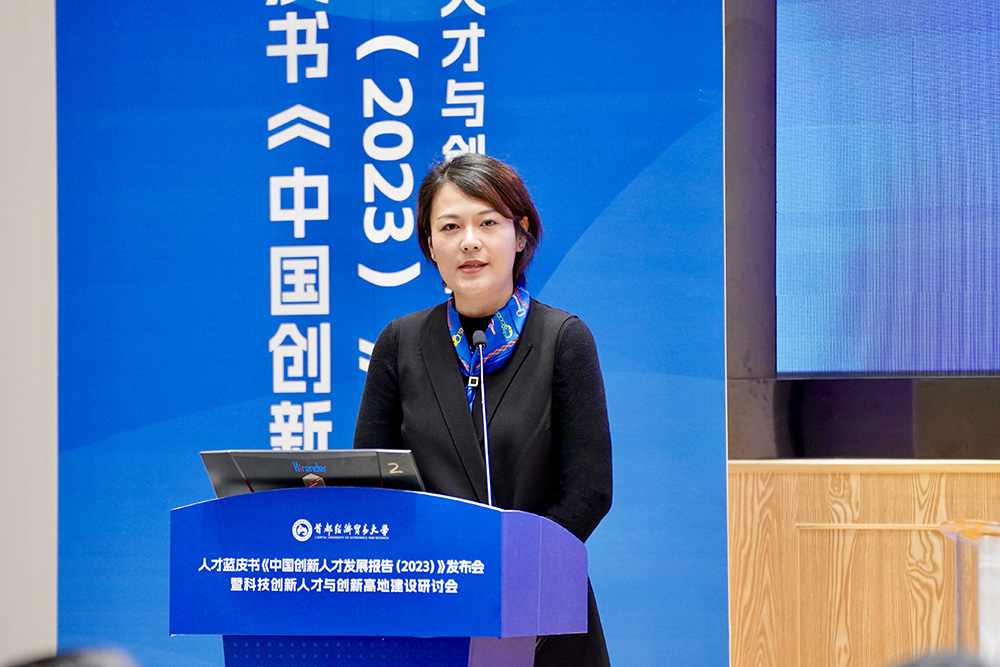
During the keynote speech, which was presided over by Chen Yanbin, experts in the field of talent research from various universities shared their latest findings on the growth pattern of sci-tech personnel, the building of centers of excellence, human capital, and innovation hub, and Shanghai’s talent dual-circulation system, in which domestic and overseas personnel reinforce each other.
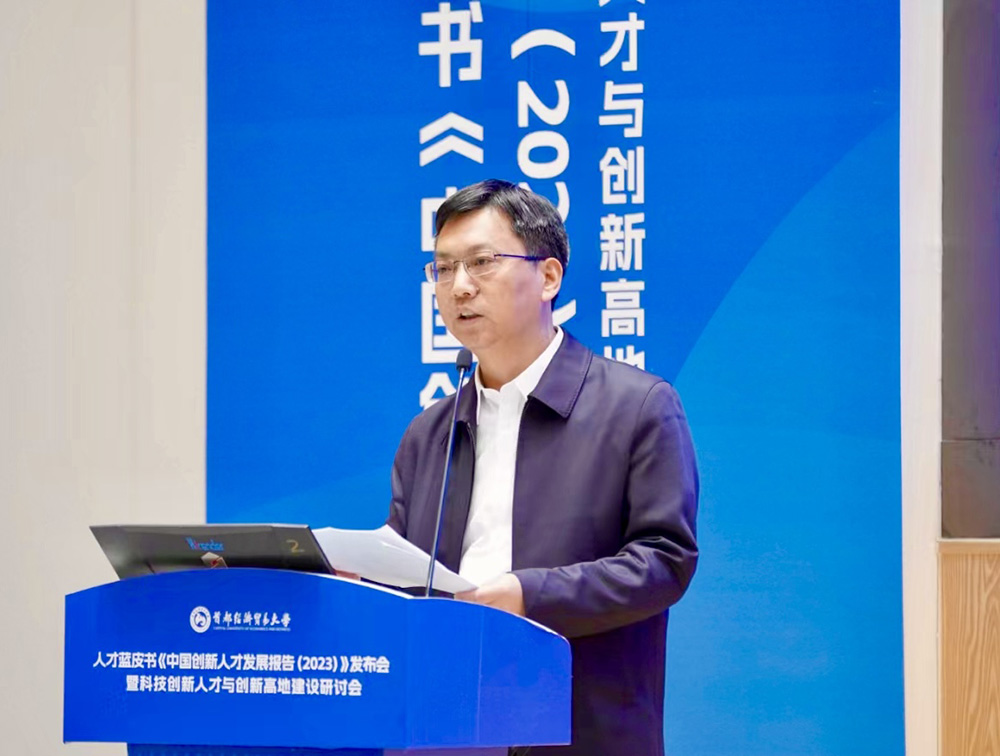
In the speech titled Growth Evaluation and Pattern of High-level Sci-tech Talents, Chen Jin defined the high-level sci-tech personnel, summarized the model of their growth pattern, and put forward a growth model covering the performance, ability, and attributes. He also built up a scientific evaluation system and application scenarios.
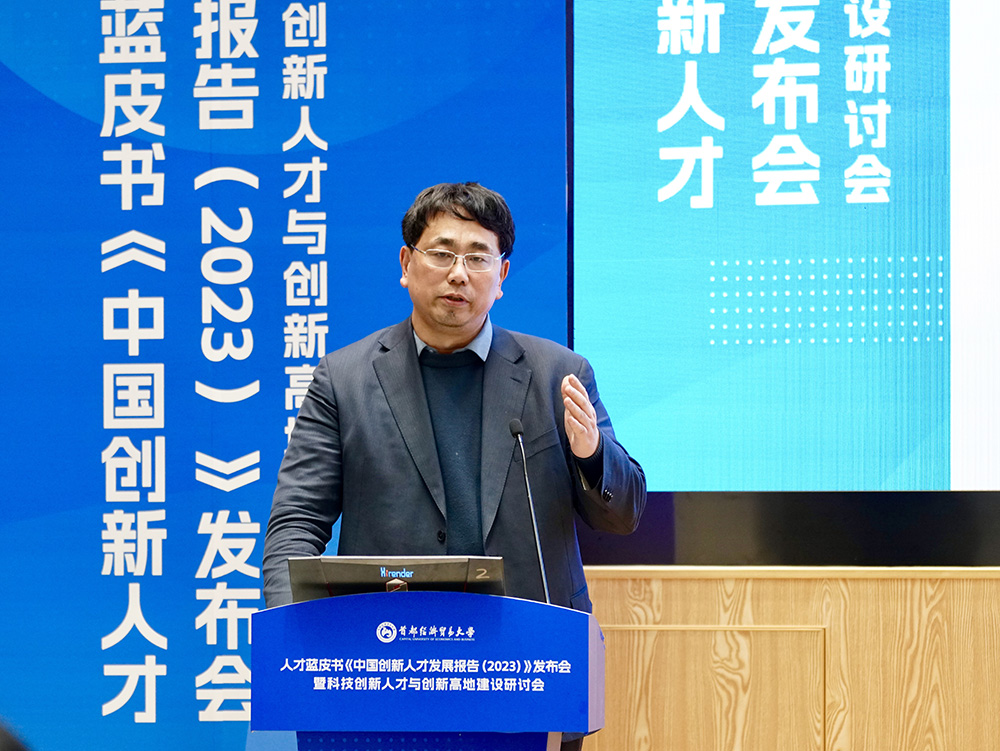
In the speech titled Building Talent Centers And Innovation Hubs of Global Importance, Xu Fang provided new insights for excellence and innovation hubs based on theoretical and practical research, strategic research on promoting the symbiosis evolution of the rational distribution of personnel, deep integration of the personnel chain to support the innovation chain and industrial chain, talent empowerment mechanism for major scientific research platforms to develop technologies in key fields, to construct the talent hub in Beijing, and the innovation ecosystem for personnel and the optimization of policies, etc.
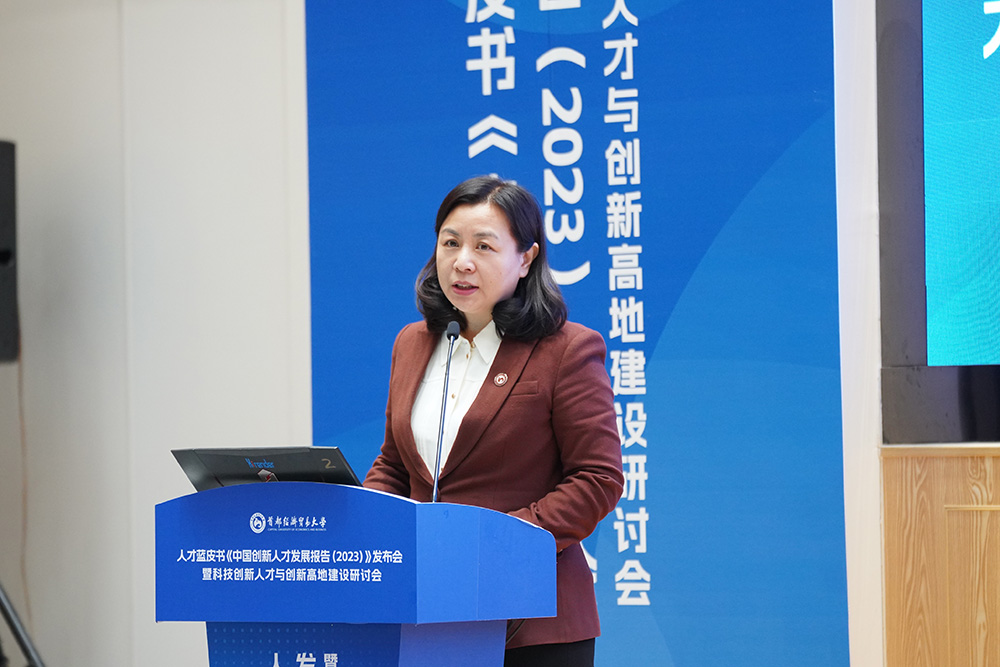
In the speech titled Human Capital Density and Innovation Hub, Lai Desheng elaborated on the significance of human capital density for the construction of innovation hub from human capital density, measurement method and contributing factors. Human capital density reflects the utilization efficiency and innovation potential of human capital, which is necessary to promote innovation in the era of digital economy, as well as a requisite for China to become a talent center and innovation hub.
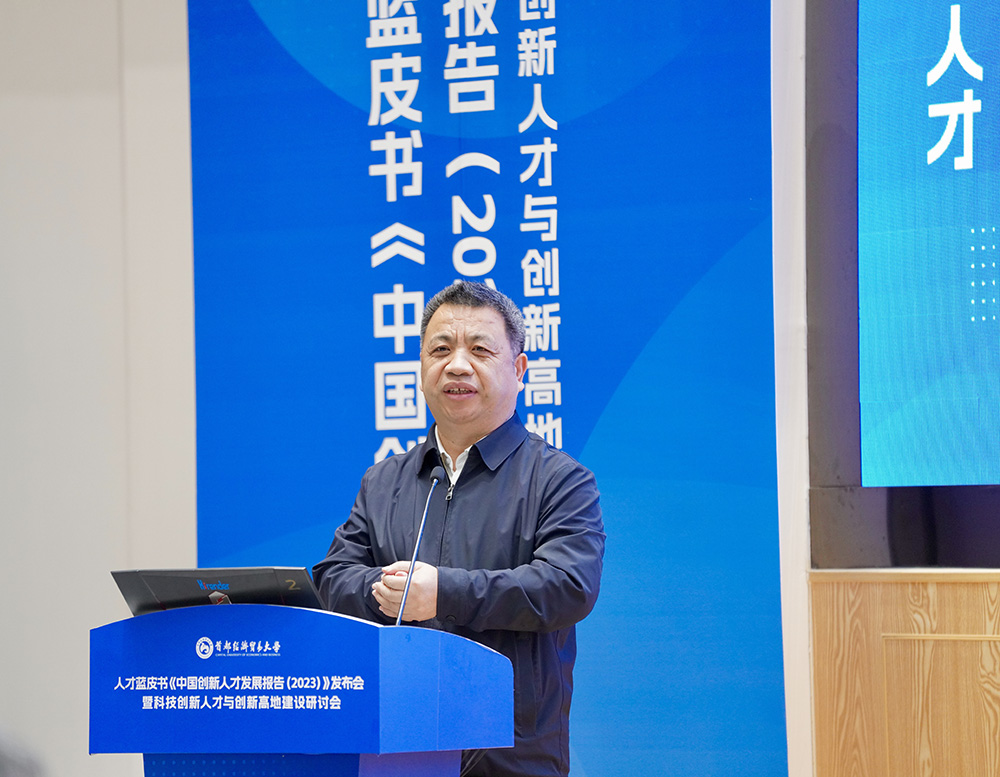
In the speech titled Shanghai Talent Hub Construction and Talent Dual Circulation System, Yao Kai proposed that Shanghai should strengthen the high-level talent ecological base of the “evaluation system of entrance exam” (which includes academic proficiency test, overall quality appraisal and National College Entrance Examination), pool resources to create a multi-chain internal development ecosystem, and construct a unified market for Yangtze River Delta personnel, so as to give fuller play to the leadership and influence of the world-class talent hub. These efforts shall advance high-quality concentration and high-efficient mobility of the regional and international personnel, and build a dual circulation.
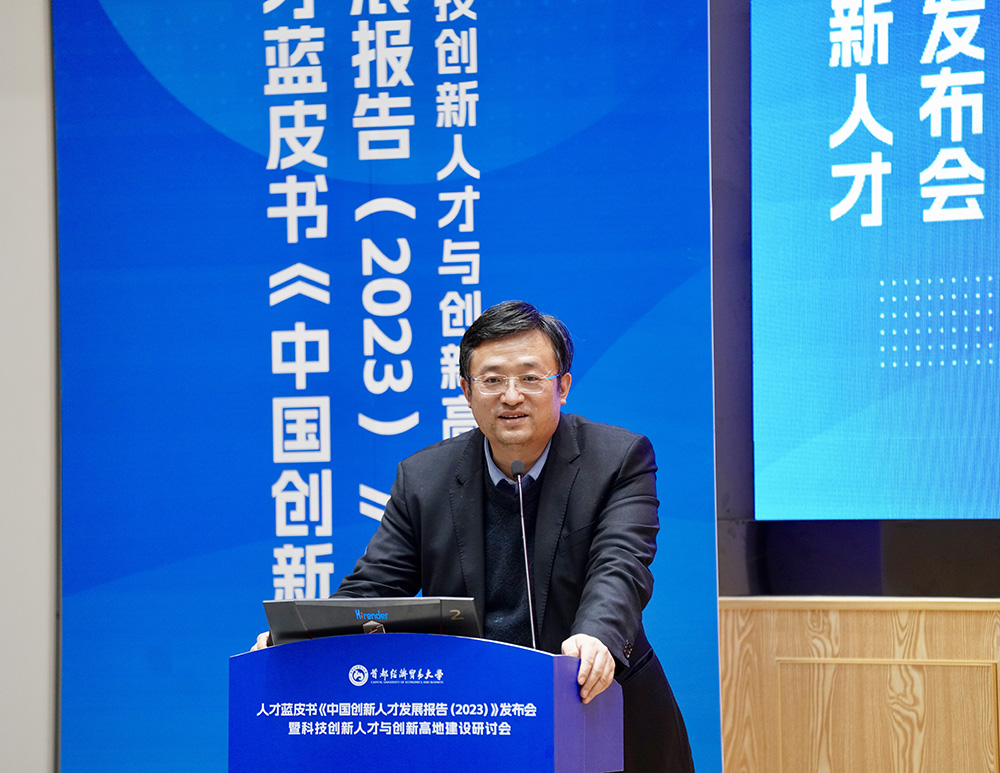
Experts shared suggestions on the significance and prospects of the Blue Book during the discussion, which was presided over by Li Xiaoman, Associate Professor of the School of Labor Economics of CUEB.
Present at the discussion were Chen Baoming, Deputy Director of Exchange, Development and Service Center for Science and Technology Talents of the Ministry of Science and Technology of PRC, Zhou Jianzhong, Executive Director and researcher of Science Popularization and Education Research Support Center of Institutes of Science and Development, Chinese Academy of Sciences, Yun Wei, Director of Economics and Management of Social Sciences Academic Press, Zhong Zurong, Vice President and Professor of Beijing Academy of Educational Sciences, Ren Wenshuo, Research Director and Third-Class Researcher of Chinese Academy of Personnel Science, and Ye Tanglin, Executive Deputy Dean, Professor and Doctoral Supervisor of Academy of Metropolis Economic and Social Development of CUEB.
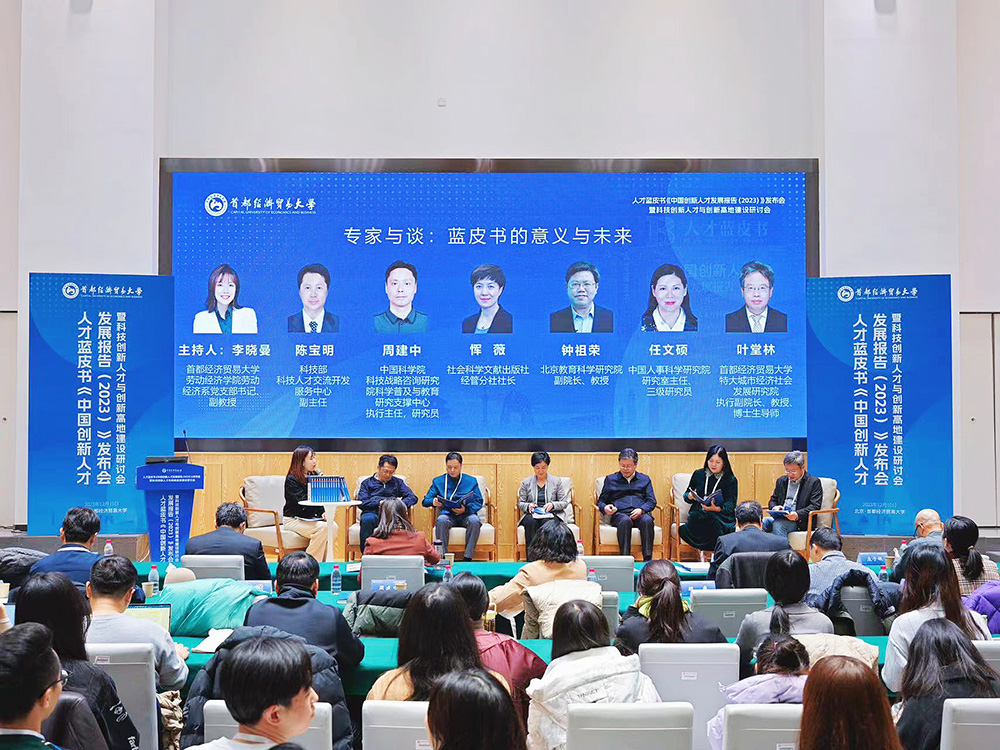
Experts agreed that it was high time to release this pioneering Blue Book which can highlight the theoretical and practical experience of innovative personnel with Chinese characteristics through the integration of multidisciplinary research. Moreover, it can provide strong support for the development of innovative personnel, and is an important carrier connecting governments, production, universities, and research, which can greatly promote the development and construction of personnel disciplines. Experts expected that the Blue Book would help further explore the way to achieve the integration of “education, science and technology, and personnel”, further explain what “innovation” should be, and keep an eye on world-class strategic scientists, first-class sci-tech leaders and innovation teams and young sci-tech personnel, thus making greater contributions to the development of Chinese innovative personnel.
To contribute to the development of innovative personnel in China, experts shared their research findings, analyzed the key and difficult issues, and found solutions to “Innovative Talent and the Construction of Innovation Hubs” during the roundtable forum, which was presided by Professor Miao Rentao of School of Labor Economics and Professor Du Pengcheng of School of Economics of CUEB, respectively.
Present at the roundtable discussion were Professor and Doctoral Supervisor Yu Haibo, Secretary of the Party Committee of School of Government of Beijing Normal University, Liu Ying, Professor and Doctoral Supervisor of School of Public Administration and Policy of Renmin University of China, Feng Xiliang, Professor and Doctoral Supervisor of School of Labor Economics of CUEB, Gao Zhonghua, Researcher and Doctoral Supervisor of Institute of Industrial Economics of Chinese Academy of Social Sciences (CASS), Chen Xiaoping, Professor and Deputy Director of the Institute of Talent Evaluation and Development for the Greater Bay Area of Guangdong University of Finance and Economics (GDUFE); Wu Yuchen, Assistant Researcher of Chinese Academy of Personnel Science; Yang Xuhua, Professor and Doctoral Supervisor of School of Labor Economics of CUEB; and Li Xiaoman and Miao Rentao, Associate Professors of School of Labor Economics of CUEB.
During the roundtable forum, experts had an in-depth discussion on the basic theories, academic frontiers, related policies, and hot topics of innovative personnel development from the aspect of innovative talent development strategy, micro measurement of innovative personnel, the construction of innovative hubs, innovative personnel policy, sci-tech talent sharing, digital talent cultivation and craftsmanship of outstanding engineers, etc. They also delivered multi-level keynote speeches and shared illuminating cases, which provided intellectual support for the development of innovative personnel and innovative hubs.
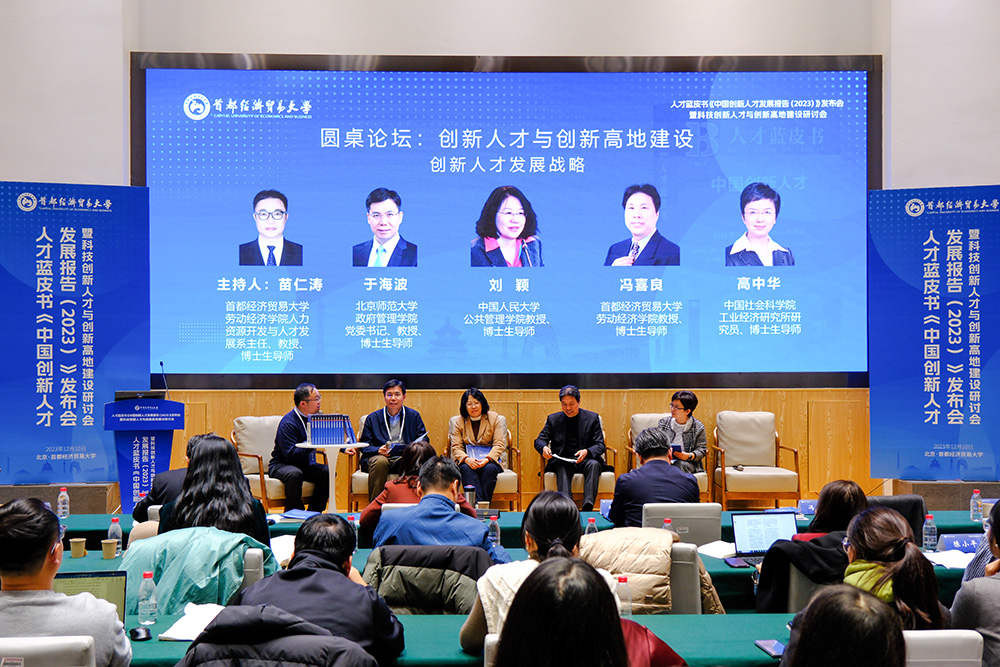
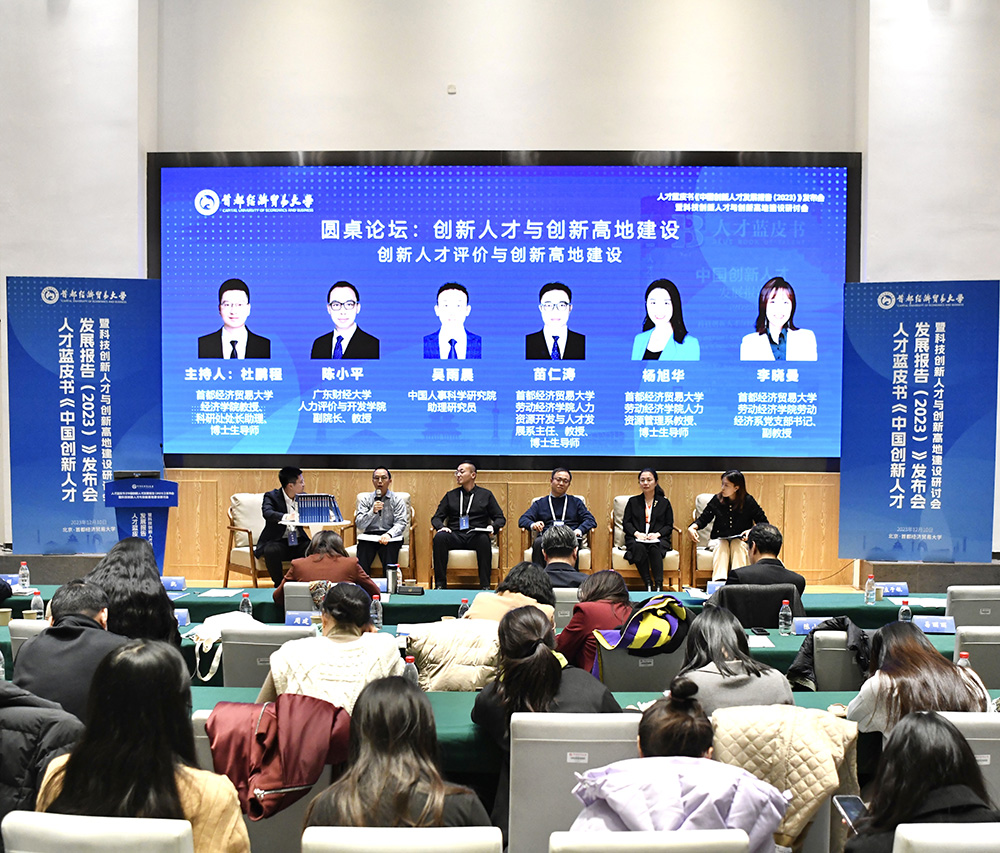
Present at the meeting were Cheng Wenjin, Director of the Think Tank Department of Beijing City Federation of Social Science Circles and Beijing Planning Office of Philosophy and Social Science, Zhang Pengfei, Deputy Director of Human Resources Research Center of Organization Department of Beijing Municipal Committee, Zhang Wenqiong, Deputy Director of Beijing Science and Technology Talent Development Center, Zhuang Ziyin, Second-Class Professor and Doctoral Supervisor of Economics and Management School of Wuhan University, Yi Lili, Associate Professor of the Party School of the Central Committee of CPC (National Academy of Governance), Wei Wei, Professor of the Beijing Wuzi University, and experts and scholars from Tsinghua University, Party School of the Central Committee of CPC(National Academy of Governance), Fudan University, Beijing Normal University, Renmin University of China, Wuhan University, Guangdong University of Finance and Economics, Chinese Academy of Sciences, Chinese Academy of Social Sciences, Chinese Academy of Personnel Science, Academy of Military Sciences, Exchange, Development and Service Center for Science and Technology Talents of the Ministry of Science and Technology of PRC, Beijing Academy of Educational Sciences, Shanghai Institute for Science of Science, and the field of human resources in research institutes, heads from human resources department as well as heads of related offices, teachers and students of CUEB.
